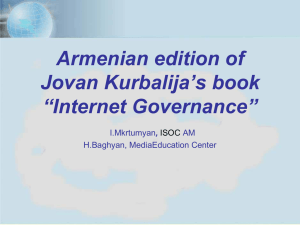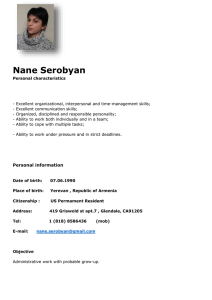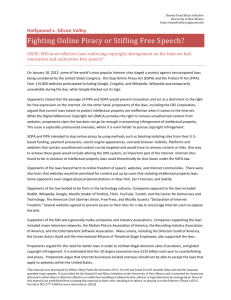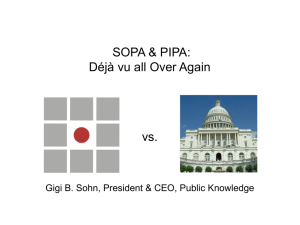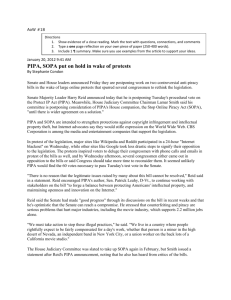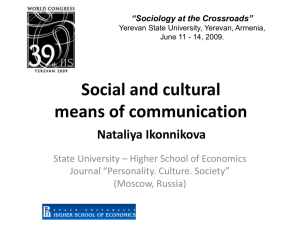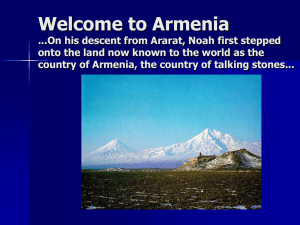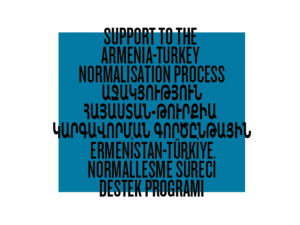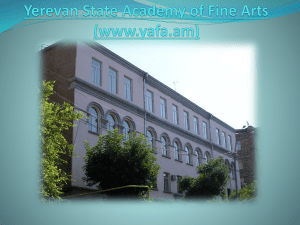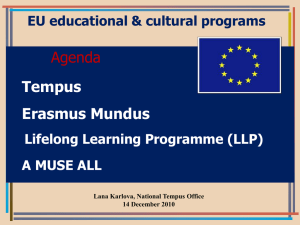ISOC position on ACTA, PIPA and SOPA
advertisement
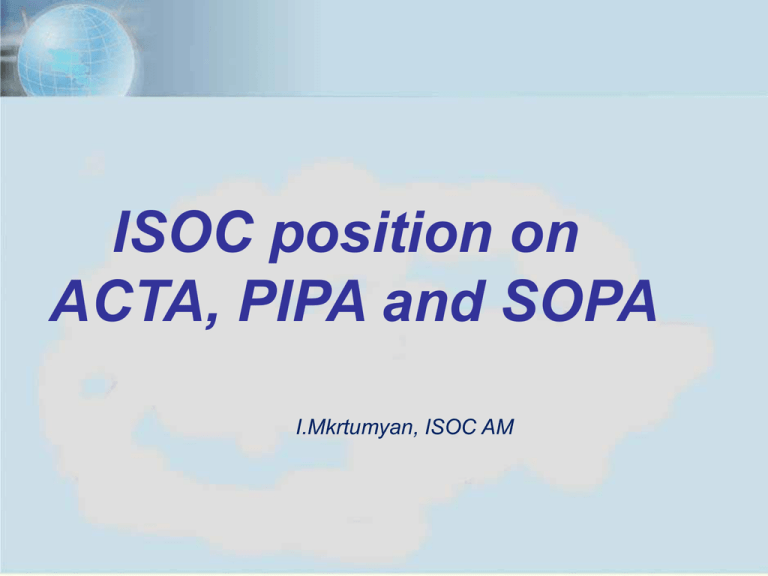
ISOC position on ACTA, PIPA and SOPA I.Mkrtumyan, ISOC AM Yerevan, July 11, 2012 1 Internet Society of Armenia (ISOC AM) is an Armenian Chapter of ISOC and in its activity is following the guidelines set by ISOC Yerevan, July 11, 2012 2 What is ACTA, PIPA and SOPA and what danger can expect us? • PIPA – Protect Intellectual Property Act • SOPA – Stop On-Line Piracy Act • ACTA - Anti-Counterfeiting Trade Agreement Yerevan, July 11, 2012 3 What Happens if PIPA is Passed? •PIPA contains provisions that will allow the federal government to have an unconstitutional amount of power in regards to censoring Americans’ access to the internet. •All websites on the internet will be liable for content added by users – comments, status updates, etc. •Social media networks like Facebook could face prosecution over content uploaded by users. •The Federal Government could forcibly require that Internet Service Providers (ISPs) block websites deemed as “enablers” of copyright infringement. Yerevan, July 11, 2012 4 SOPA is nothing more so than the U.S. government and private corporations black list. Here is a breakdown of the power given to the government and private corporations. •The U.S. Attorney General can now seek a court order that would force search engines, advertisers, DNS providers, servers, and payment processors from having any contact with allegedly infringing websites. •It will allow private corporations to create their own personal hit lists composed of websites they feel are breaking their copyright policies, ironically this doesn’t have any odd feelings of a legal mafia at all. These companies will be able to directly contact a website’s payment processors a notice to cut all off payment involvement with the targeted website. This payment processors and website of question will then have five days to act before it is simply taken down. •Payment processors will have the power to cut off any website they work with, as long as they can provide a strong reason of why they believe this site is violating copyrights Yerevan, July 11, 2012 5 ACTA is a bad agreement ACTA was negotiated in extreme secrecy by a small group of wealthy nations. As leaked documents make clear, the explicit goal of this approach was to bypass existing international instituions like WIPO where other countries might object to even stricter IP enforcement. Instead, ACTA was a "coalition of the willing" which "would aim to set a 'gold standard' for IPR [intellectual property rights] enforcement among a small number of like-minded countries, and which other countries might aspire to join." Yerevan, July 11, 2012 6 How Does This Affect You Well by now one probably has gained a good understanding of what both PIPA and SOPA are, and is wondering how exactly will these acts will directly affect how citizens use the internet. Well in all honestly, a lot of things will change. Yerevan, July 11, 2012 7 Blog Sites like 1stwebdesigner could be blocked or shut down As stated prior in what PIPA and SOPA are and what will they enable U.S. government agencies and private companies to do, the internet will become a hunt for any little bit of possible copyright violation. Of course the government loves blogs and bloggers, so it is only natural to think that they will receive a lot of special attention. These acts make it the blog owners responsibility for everything that is displayed on their site, including the comments of visitors. So say an article is published one day featuring a logo, or trademark, of corporation and that corporation doesn’t like that it is being put on display on the site. Now the author of this article could have used it as a teaching method, critique, praising good design, or anything you can think of, it doesn’t matter. With these acts being only direct enough to give an area for attack, and vague enough to manipulate and twist seemingly any possible way, any type of accusation can be made and found true. Yerevan, July 11, 2012 8 Say Goodbye to Innovation These acts are stopping developers from coming up with the next big thing in the online market that could change how we use the internet. Let’s say that these acts were around back when the internet was started, how many of the most popular sites would still have come into fruition. There would be no Facebook, YouTube, MediaFire, SoundCloud, Twitter, DropBox, or any other site that can be targeted as a place where online piracy could take place. Is it even possible to think about what the internet would be like without sites like this? Yerevan, July 11, 2012 9 The Internet is an extraordinary platform for innovation. It has benefitted from broad participation in both the development and use of Internet technology, services, applications and policy. The Internet’s openness has been critical to its development and continued success. Openness is the key to continued innovation and investment in the Internet and all the associated social, economic, and cultural benefits it brings. The history of the Internet’s development demonstrates that technology can be used for beneficial, and sometimes unforeseen, purposes. The Internet Society believes, therefore, that legal frameworks should support the open and unrestricted development of Internet technologies and should not limit the development and use of technologies for legitimate purposes. Yerevan, July 11, 2012 10 Legal Action Over A Child Singing A Song It is quite oblivious that none of the people on sites like YouTube have been given permission from record label execs to sing their favorite song, and then proceed to post it on a video sharing site. However will that be a problem for the record execs? Yerevan, July 11, 2012 11 The Internet Society has noted with concern a number of U.S. legislative proposals that would mandate DNS blocking and filtering by ISPs in order to protect the interests of copyright holders. We agree with proponents of the Protect-IP Act (PIPA) and Stop Online Piracy Act (SOPA) that combating illegal online activities is a very important public policy objective. However, policies that are enacted to achieve this goal must not undermine the viability of the Internet as a globally reachable platform. Yerevan, July 11, 2012 12 ISOC is also disappointed that the ACTA participants did not adopt a truly open, transparent and inclusive multistakeholder approach to the development of the substance of the proposed agreement at least with respect to those terms which pertain to the Internet. Yerevan, July 11, 2012 13 The Internet Society is deeply concerned about increased attempts by certain governments in many regions of the world to control their citizens’ access and use of the Internet. Often such actions are taken without regard to the basic principles of human rights and due process. Yerevan, July 11, 2012 14
